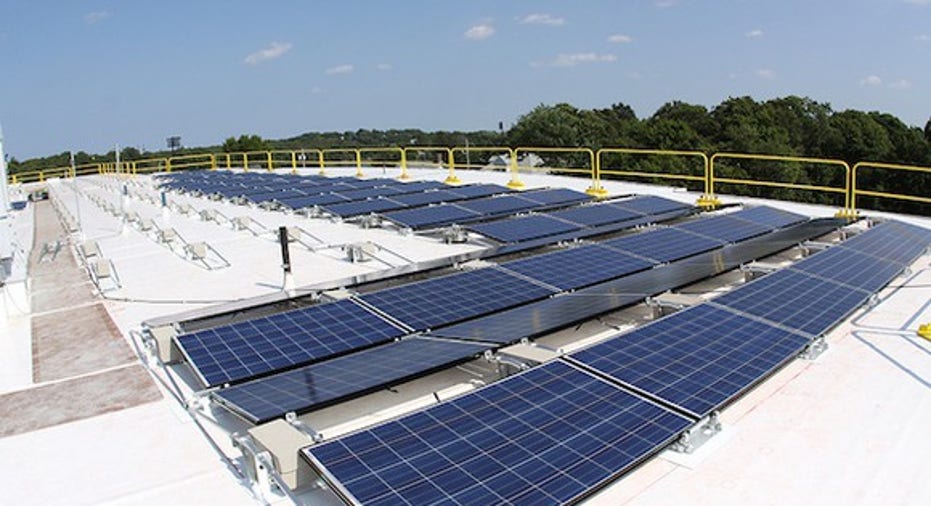Corporate America Loves Solar Energy

The decision to install solar panels can be driven by factors like a desire to use clean energy or an interest in becoming more self-sufficient when it comes to electricity. But when large companies choose to go solar, they're doing so based on the dollars and cents of the investment. You may not know if the Targetor Walmartstore you're shopping at has solar, but if it does, it's saving the company money. And today, U.S. corporations are installing solar energy rapidly as a way to save millions of dollars.
Some corporate solar installations provide both energy and shade for customers, like this one. Image source: SunPower.
Corporate America loves solar
The Solar Energy Industries Association recently released its Solar Means Business 2016 report, and it showed a big increase in the amount of solar energy on corporate rooftops. There's now over 1 GW of solar for corporate customers, enough to power 193,000 homes. Target led the way with 147.5 MW, with 70 MW installed so far in 2016, while Walmart is using 145.0 MW. Apple's93.9 MW and Costco's50.7 MW means those companies are also among the top five installers.
Seven out of ten among the top ten corporate customers have installed SunPower (NASDAQ: SPWR) solar panels, reflecting the company's corporate focus. SolarCity (NASDAQ: SCTY), meanwhile, has Walmart as a major customer.
One incredible stat from the report is that more than three quarters of the commercial solar installations and half of the capacity are at data centers. Large data centers are often buildings with flat roofs, perfect for solar energy, and they're energy hogs. So offsetting some, or all, of the energy consumption with solar on a roof or a nearby field is an attractive option.
Image source: SolarCity.
How big is commercial solar today?
In the first three quarters of 2016 there was 142 MW of solar installed at corporate sites. Compared to a total of 13.9 GW expected to be installed in 2016, this is a fairly small market. But it's becoming increasingly important.
Utility-scale solar, which will be around 7.8 GW this year, is the largest segment of the solar market in general. But it's highly volatile, and 2017 will see only a small number of new projects signed and built. Commercial solar is improving in viability, and will likely be a growth market in the future.
One reason that corporate solar customers haven't traditionally been a big customer base is that it's hard to finance their installation. It may sound crazy, but it's easier to finance a residential solar project that's backed by a customer with a reliable FICO score than it is a corporate customer with anything but a stellar credit rating. Companies come and go, leaving creditors in their wake, and solar companies -- and their financers -- don't want to take the loss for companies that go out of business. Today, solar is cheap enough that companies can put systems on their balance sheets, or even take out loans to finance projects. This means the financing barrier is breaking down, opening up the market.
Who is winning in commercial solar
The two companies that have put a lot of attention on commercial solar are SunPower and SolarCity. Both have installation designs built to make commercial rooftop installations cost effective and efficient.
SunPower's pitch is based more around a higher efficiency product that's able to squeeze more energy out of each square foot. In small installations, a higher efficiency can lead to lower cost per watt -- that's a big reason the company is serving so many of these customers.
A secret billion-dollar stock opportunity The world's biggest tech company forgot to show you something, but a few Wall Street analysts and the Fool didn't miss a beat: There's a small company that's powering their brand-new gadgets and the coming revolution in technology. And we think its stock price has nearly unlimited room to run for early in-the-know investors! To be one of them, just click here.
Travis Hoium owns shares of Apple and SunPower. The Motley Fool owns shares of and recommends Apple, Costco Wholesale, and SolarCity. The Motley Fool has the following options: long January 2018 $90 calls on Apple and short January 2018 $95 calls on Apple. Try any of our Foolish newsletter services free for 30 days. We Fools may not all hold the same opinions, but we all believe that considering a diverse range of insights makes us better investors. The Motley Fool has a disclosure policy.



















